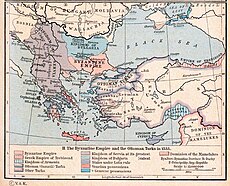Principality of Serbia (early medieval)
Raška Рашка | |||||||||
|---|---|---|---|---|---|---|---|---|---|
| 7th century–14th century | |||||||||
 Raška, 1150–1220, during the rules of Stefan Nemanja and Stefan Prvovenčani | |||||||||
| Capital | Stari Ras | ||||||||
| Common languages | Serbian | ||||||||
| Religion | Eastern Orthodox | ||||||||
| Government | Principality | ||||||||
| Historical era | Medieval | ||||||||
• Arrival of Serbs | 7th century | ||||||||
• Acceded into Serbian Empire | 14th century | ||||||||
| |||||||||
Raška (Template:SrL; alternative spellings have included Raschka, Rascia and Rassa) was the central and most successful medieval Serbian state (or župa, area ruled by a župan) that unified neighboring Serbian tribes into a main medieval Serbian state in the Balkans.
History
Constantine VII Porphyrogenitos describes Raška (Rascia) in De Administrando Imperio as being settled by Serbs at the start of the 7th century. Also in De Administrando Imperio, he wrote that the Serbs resided in Zachumlie (Zahumlje), Trebounia (Travunia), the Zeta (Duklja), Bosnia (Bosna) and Pagania (Paganija).
From the early 7th century, the history of Raška becomes intimately bound with the history of the Serb House of Vlastimirović, which ruled from Raška. The house was named for Knez Vlastimir, who was the great-great-grandson of the Unknown Archont who led the Serbs to the Balkans from White Serbia.
The House of Vlastimirović was later succeeded by the House of Nemanjić and Stefan Dušan of the House of Nemanjić transformed Raška into powerful Serbian Empire in the 14th century.
Name origin theory
The state of Raška was named after the Raška River in present-day south-western Serbia. It is thought that Sarmatian Serboi, an ancient tribe from the Caucasus that probably gave its name to the Slavic Serbs, left their traces around the river Volga (Araxes in Greek[citation needed] ), which is also called "Rashki". This name is found wherever the name Serb is found in clusters.
| History of Serbia |
|---|
 |
|
|
Later usage of the term
Between 15th and 18th century, term Raška (Rascia, Ráczság) was used to designate southern parts of the Pannonian Plain that were inhabited by Serbs who migrated there from the territory of original Raška in the Balkans.
References
- Vladimir Ćorović, Ilustrovana istorija Srba, knjige 1-6, Beograd, 2005-2006.
- Sima M. Ćirković, Srbi među evropskim narodima, Beograd, 2004.
- Tim Džuda, Srbi, Beograd, 2003. (translation of: Tim Judah, The Serbs, 2000.)
- Milan Tutorov, Mala Raška a u Banatu, Zrenjanin, 1991.

